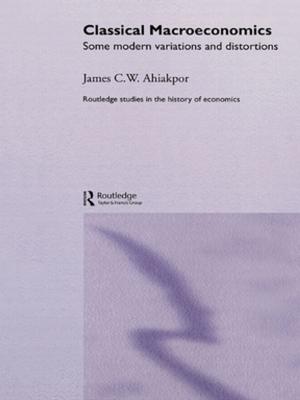Culture and Economics in the Global Community
A Framework for Socioeconomic Development
Business & Finance, Economics| Author: | Kensei Hiwaki | ISBN: | 9781317156093 |
| Publisher: | Taylor and Francis | Publication: | May 13, 2016 |
| Imprint: | Routledge | Language: | English |
| Author: | Kensei Hiwaki |
| ISBN: | 9781317156093 |
| Publisher: | Taylor and Francis |
| Publication: | May 13, 2016 |
| Imprint: | Routledge |
| Language: | English |
Many of the concepts, values and basic assumptions on which 'modern' economic and business theory is based do not translate into or convey the same meaning in non-European languages or non-Western cultures as they do in Western societies. This results in a mismatch between what Many of the concepts, values and basic assumptions on which 'modern' economic and business theory is based do not translate into or convey the same meaning in non-European languages or non-Western cultures as they do in Western societies. This results in a mismatch between what have now become global economic values and 'local' cultural ones. Kensei Hiwaki considers a new paradigm - that a sound culture is needed to underpin development, employment and trade, and an optimal development path. This concept is discussed against the background of the author's contention that his own Japanese society has succumbed to unsustainable modern tendencies leading to the antithesis of sustainable development and placing the society and economy in a 'credibility trap' into which it is predicted other countries, like China, might also fall. Professor Hiwaki presents a detailed theoretical framework for balanced socioeconomic development relevant to sustainable development of the global community, explaining the pivotal concepts on which it is based, as well as the institutional and practical implications of adopting the paradigm, including new approaches to taxation, employment, trade, multi-media communications, and global governance. Culture and Economics in the Global Community is a challenging but ultimately hopeful book that introduces new perspectives for leaders in the political arena, in business, in development agencies, and to researchers and others with a professional or academic interest in economics, trade, governance and environmental issues, social policy or cultural anthropology.
Many of the concepts, values and basic assumptions on which 'modern' economic and business theory is based do not translate into or convey the same meaning in non-European languages or non-Western cultures as they do in Western societies. This results in a mismatch between what Many of the concepts, values and basic assumptions on which 'modern' economic and business theory is based do not translate into or convey the same meaning in non-European languages or non-Western cultures as they do in Western societies. This results in a mismatch between what have now become global economic values and 'local' cultural ones. Kensei Hiwaki considers a new paradigm - that a sound culture is needed to underpin development, employment and trade, and an optimal development path. This concept is discussed against the background of the author's contention that his own Japanese society has succumbed to unsustainable modern tendencies leading to the antithesis of sustainable development and placing the society and economy in a 'credibility trap' into which it is predicted other countries, like China, might also fall. Professor Hiwaki presents a detailed theoretical framework for balanced socioeconomic development relevant to sustainable development of the global community, explaining the pivotal concepts on which it is based, as well as the institutional and practical implications of adopting the paradigm, including new approaches to taxation, employment, trade, multi-media communications, and global governance. Culture and Economics in the Global Community is a challenging but ultimately hopeful book that introduces new perspectives for leaders in the political arena, in business, in development agencies, and to researchers and others with a professional or academic interest in economics, trade, governance and environmental issues, social policy or cultural anthropology.















